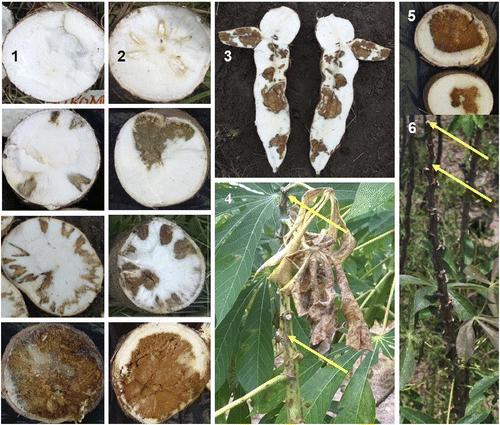
Credit: Rudolph R. Shirima, et al.
A nutty-flavored, starchy root vegetable, cassava (also known as yuca) is one of the most drought-resistant crops and is a major source of calories and carbs for people in developing countries, serving as the primary food for more than 800 million people. However, the crop is vulnerable to virus diseases, such as cassava brown streak disease (CBSD), which poses the biggest threat to production in East and Central Africa.
CBSD typically spreads through the whitefly vector (Bemisia tabaci) or the common practice of using recycled stems from the previous season’s crop. Although the planting of clean seed would be an effective way for farmers to reduce CBSD, the seed is often not available and when it is available, it is too expensive. Instead, farmers use recycled planting materials which is sometimes infected with cassava brown streak ipomoviruses.
To understand how cassava virus disease builds up over repeated planting cycles, a team of Tanzania-based scientists conducted experiments in coastal Tanzania, where there are two planting seasons. The first, Masika, is the long rainy season from March to June and the second, Vuli, is the short rainy season from October to December. The researchers found that crops in each season saw a gradual loss of quality over time, but this degeneration varied between varieties and seasons.
“Overall, varieties that are susceptible to cassava brown streak disease (CBSD) had higher levels of degeneration than tolerant ones,” explained Rudolph Shirima, a researcher affiliated with the University of Dar es Salaam and the International Institute of Tropical Agriculture. “However, susceptible varieties planted in Masika degenerated much more slowly than when they were planted in Vuli, where most plants became infected and severely damaged after a single season.”
These results suggest that, with careful selection of healthy stems for replanting, it is possible to recycle susceptible varieties over several seasons without significant loss of quality if they are planted in Masika and where phytosanitary measures are applied. These findings also suggest that farmers should plant susceptible varieties during Masika and plant disease-resistant varieties during Vuli.
This is the first research to compare two planting seasons in a CBSD hot-spot location and clearly demonstrates the importance of planting date on disease spread. It is also the first paper to highlight the effects of recycling cassava planting material over several seasons. To learn more about these findings, read “Assessing the Degeneration of Cassava Under High-Virus Inoculum Conditions in Coastal Tanzania,” published in the October issue of Plant Disease.
“These findings are groundbreaking in the sense that they will revolutionize the way breeders’ materials are evaluated and provides guidance for improving cassava seed system,” says Shirima. “In fact, the authors are already working with researchers with these skills with the aim of developing degeneration models that will help to predict cassava disease degeneration outcomes for varieties with known levels of virus resistance.”
###
These findings may also be applicable to other root and tuber crops equally affected by virus diseases.
Media Contact
Ashley Bergman Carlin
[email protected]
651-994-3832
Related Journal Article
http://dx.




